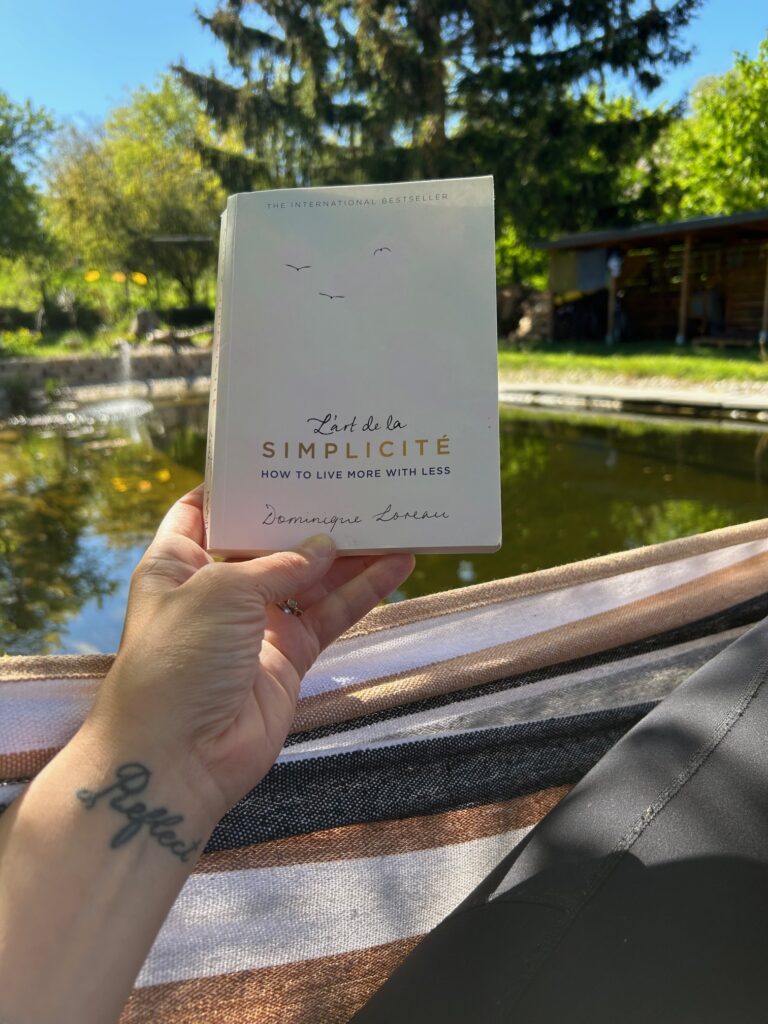
“Simplicity means possessing little, clearing the way for the bare necessities, the quintessence of things. Simplicity is beautiful because it brings hidden joys.”
This beautiful, soulful book expresses what many of us desire, but often can’t achieve: a life of simplicity and beauty. While I have always valued experiences over things, I still seem to have accumulated a lot of things along the way. The older I seem to get, the more valuable the act of paring down seems to be.
This book is inspiring on so many levels. While I was expecting a “rid yourself of the clutter” type of book, it’s so much more. French-born Dominique Loreau has lived for the past 40 years in Japan, where she has adapted many Asian influences on the art of simplicity.
The book is divided into three sections (home, body, and mind) and by far, the most thoughtful section to me is the last one. If the mind is cluttered, everything else is usually cluttered. The ideas behind “Polish Yourself Like a Pebble” really resonated with me. It’s not simplicity for the sake of it, but rather as a gateway to living more aware and more fully, while integrating your home, body, and soul until the whole shines.
There are some ideas that I just couldn’t agree with (e.g., the idea that a person can possess too many books or that it’s not good to read too much) and other things that just seemed weird (e.g., enjoying a snack of pomegranate seeds while watching a movie at home) or very specifically Japanese (e.g., making a facial scrub of azuki beans. Yeah, I’ve got a lot of those hanging around my house). However, most of the concepts presented in L’Art de la Simpicite (why the non-translated French title?) I found to be insightful and aspirational.
Dominique Loreau combines her French culture and upbringing (which seems to be a direct writing style and emphasis on luxury items and rituals) with insights gained from living most of her adult life in Japan (Zen principles and minimalism), this book is–despite the title–more of a minimalist philosophy than it is a how-to guide. As such, here are some of the ideas and takeaways that I think are worth remembering or reflecting upon:
* People want more time, than to “kill time.”
* Each day is a journey, and everything you need along the way must be carried in your bag. Your bag is an extension of you. It spends more time close to you than any item of clothing. Choose it well.
* Most of the time, people are more exhausted by the *thought* of all they have to do than by what they actually have to get done.
* Save money to work less, not buy more.
* It’s said that women who wear black lead colorful lives.
* Our environment trains our personality and influences the choices we make.
* No one can take better care of your body than you can yourself — not your doctor, your beautician, or your makeup advisor. We are responsible for our own bodies and at fault when we neglect them.
* Life begins anew each day. You are alive today, here and now. Stop believing the person you were yesterday is the person you have to be today.
I found this book to be a beautiful, meditative, aspirational, as well as inspirational guide to leading a more fully internal life by mindfully choosing a less cluttered outside existence.